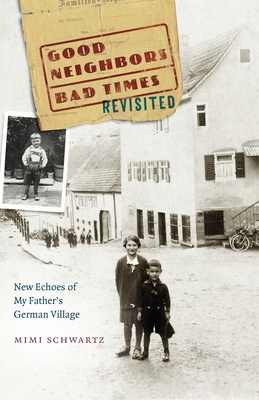Good Neighbors, Bad Times Revisited: New Echoes of My Father's German Village

Good Neighbors, Bad Times Revisited: New Echoes of My Father's German Village
Mimi Schwartz's father was born Jewish in a tiny German village thirty years before the advent of Hitler when, as he'd tell her, "We all got along." In her original memoir, Good Neighbors, Bad Times, Schwartz explored how human decency fared among Christian and Jewish neighbors before, during, and after Nazi times. Ten years after its publication, a letter arrived from a man named Max Sayer in South Australia. Sayer, it turns out, grew up Catholic in the village during the Third Reich and in 1937 moved into an abandoned Jewish home five houses away from where the family of Schwartz's father had lived for generations before fleeing to America a few months earlier. The two families had never met. Sayer wrote an unpublished memoir about his childhood memories and in Schwartz's new edition, Good Neighbors, Bad Times Revisited, the two memoirs talk to each other. Weaving excerpts from Sayer's memoir and from a yearlong correspondence with him into her book, Schwartz revisits village history from a new perspective, deepening our understanding of decency and demonization. Given the rise of xenophobia, white supremacy, and anti-Semitism in the world today, this exploration seems more urgent than ever.
Mimi Schwartz's father was born Jewish in a tiny German village thirty years before the advent of Hitler when, as he'd tell her, "We all got along." In her original memoir, Good Neighbors, Bad Times, Schwartz explored how human decency fared among Christian and Jewish neighbors before, during, and after Nazi times. Ten years after its publication, a letter arrived from a man named Max Sayer in South Australia. Sayer, it turns out, grew up Catholic in the village during the Third Reich and in 1937 moved into an abandoned Jewish home five houses away from where the family of Schwartz's father had lived for generations before fleeing to America a few months earlier. The two families had never met. Sayer wrote an unpublished memoir about his childhood memories and in Schwartz's new edition, Good Neighbors, Bad Times Revisited, the two memoirs talk to each other. Weaving excerpts from Sayer's memoir and from a yearlong correspondence with him into her book, Schwartz revisits village history from a new perspective, deepening our understanding of decency and demonization. Given the rise of xenophobia, white supremacy, and anti-Semitism in the world today, this exploration seems more urgent than ever.
Mimi Schwartz is professor emerita in the writing program at
Descrierea produsului
Mimi Schwartz's father was born Jewish in a tiny German village thirty years before the advent of Hitler when, as he'd tell her, "We all got along." In her original memoir, Good Neighbors, Bad Times, Schwartz explored how human decency fared among Christian and Jewish neighbors before, during, and after Nazi times. Ten years after its publication, a letter arrived from a man named Max Sayer in South Australia. Sayer, it turns out, grew up Catholic in the village during the Third Reich and in 1937 moved into an abandoned Jewish home five houses away from where the family of Schwartz's father had lived for generations before fleeing to America a few months earlier. The two families had never met. Sayer wrote an unpublished memoir about his childhood memories and in Schwartz's new edition, Good Neighbors, Bad Times Revisited, the two memoirs talk to each other. Weaving excerpts from Sayer's memoir and from a yearlong correspondence with him into her book, Schwartz revisits village history from a new perspective, deepening our understanding of decency and demonization. Given the rise of xenophobia, white supremacy, and anti-Semitism in the world today, this exploration seems more urgent than ever.
Mimi Schwartz's father was born Jewish in a tiny German village thirty years before the advent of Hitler when, as he'd tell her, "We all got along." In her original memoir, Good Neighbors, Bad Times, Schwartz explored how human decency fared among Christian and Jewish neighbors before, during, and after Nazi times. Ten years after its publication, a letter arrived from a man named Max Sayer in South Australia. Sayer, it turns out, grew up Catholic in the village during the Third Reich and in 1937 moved into an abandoned Jewish home five houses away from where the family of Schwartz's father had lived for generations before fleeing to America a few months earlier. The two families had never met. Sayer wrote an unpublished memoir about his childhood memories and in Schwartz's new edition, Good Neighbors, Bad Times Revisited, the two memoirs talk to each other. Weaving excerpts from Sayer's memoir and from a yearlong correspondence with him into her book, Schwartz revisits village history from a new perspective, deepening our understanding of decency and demonization. Given the rise of xenophobia, white supremacy, and anti-Semitism in the world today, this exploration seems more urgent than ever.
Mimi Schwartz is professor emerita in the writing program at
Detaliile produsului












